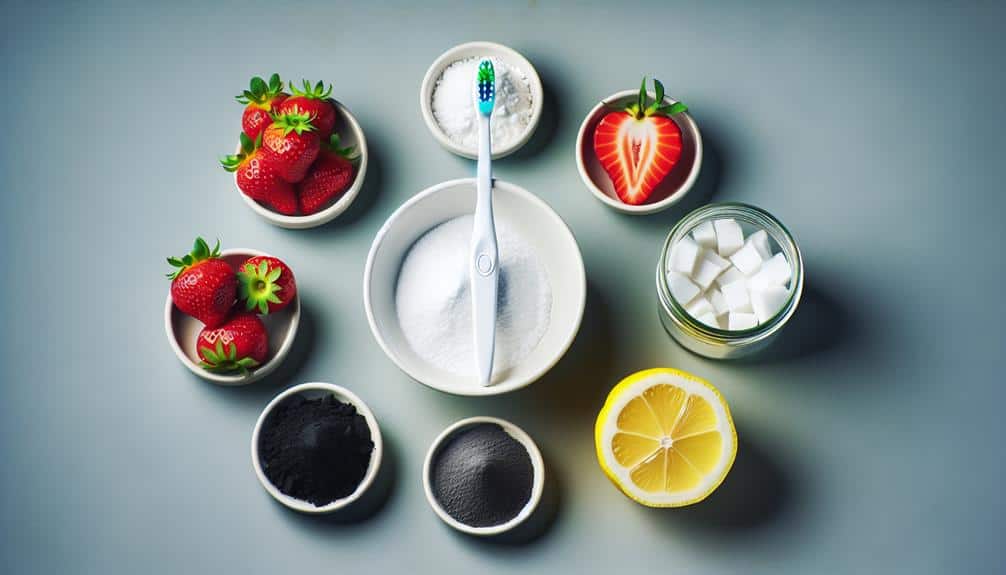To guarantee safe teeth whitening with cosmetic dentistry, it's important to consider the appropriate whitening method that suits your preferences and budget. This could involve professional treatments at a dental office for quick and expert results or opting for at-home kits based on your desired outcome. It's crucial to be aware of potential risks like tooth sensitivity and gum irritation that may result from whitening and to remember to maintain good oral hygiene practices to mitigate these effects. Regular dental check-ups and cleanings, in addition to avoiding foods that stain teeth, play a significant role in achieving long-lasting results for a brighter smile.
Selecting the right method, understanding risks, and maintaining proper oral care are essential steps for safe teeth whitening with cosmetic dentistry.
Key Points
- Consider professional whitening for safe and effective results.
- Use desensitizing toothpaste to manage sensitivity.
- Regular dental check-ups can monitor oral health during whitening.
- Avoid foods and drinks that may stain teeth for lasting results.
- Follow a consistent oral hygiene routine for optimal whitening maintenance.
Choosing the Right Whitening Method
Looking to whiten your teeth but unsure which method is best for you? Before delving into teeth whitening, consider seeking a professional consultation. A cosmetic dentist can evaluate your oral health and recommend the most suitable whitening method based on your individual needs.
When choosing between professional treatments and at-home kits, it's crucial to weigh the pros and cons of each option. Professional whitening treatments carried out at a dental office are often more potent and yield quicker results. These treatments are conducted by trained professionals who can guarantee the safety and effectiveness of the procedure. On the other hand, at-home whitening kits offer convenience and flexibility, allowing you to whiten your teeth at your own pace and in the comfort of your home. However, the results may take longer to achieve, and the strength of the whitening agents may be lower compared to in-office treatments.
Ultimately, the decision between professional whitening treatments and at-home kits depends on your preferences, budget, and desired outcome. Consulting with a cosmetic dentist can help you make an informed choice that aligns with your goals for a brighter, more confident smile.
Understanding Potential Risks
When contemplating teeth whitening methods, it's important to be aware of the significant risks associated with the process to make an informed decision about your oral care. While teeth whitening is generally safe when done under professional guidance, there are some potential side effects to be mindful of. These can include tooth sensitivity, gum irritation, and in rare cases, damage to the tooth enamel.
To minimize these risks, it's essential to follow the instructions provided by your dentist or the whitening product manufacturer carefully. Using whitening products excessively or incorrectly can increase the likelihood of experiencing these side effects. Additionally, scheduling regular dental check-ups can help monitor any changes in your oral health and address any concerns promptly.
Prevention measures such as using desensitizing toothpaste, avoiding acidic or staining foods and drinks, and opting for professional whitening treatments instead of over-the-counter products can help reduce the chances of adverse effects. By being proactive and cautious, you can enjoy the benefits of teeth whitening while minimizing any potential risks.
Maintenance Tips for Long-lasting Results
For long-lasting results after teeth whitening, implementing a consistent oral hygiene routine is important. Brush your teeth at least twice a day with a fluoride toothpaste and floss daily to remove plaque and prevent staining. Consider using a whitening toothpaste to maintain your bright smile.
Regular dental check-ups and cleanings are vital to address any potential issues early on and keep your teeth healthy and white. Avoid foods and beverages that can stain your teeth, such as coffee, tea, red wine, and berries. If you do consume these items, rinse your mouth with water afterward.
Additionally, consider using a straw when drinking beverages that may cause staining to minimize contact with your teeth. Maintaining good diet habits can also contribute to long-lasting results. Eating crunchy fruits and vegetables like apples and carrots can help naturally clean your teeth and prevent discoloration.
Frequently Asked Questions
Can Teeth Whitening Procedures Be Done on Sensitive Teeth?
If you have sensitive teeth, addressing it before teeth whitening is essential. Sensitivity management is key. Dentists may recommend desensitizing products to prepare your teeth. Remember, with proper care, you can still achieve a brighter smile.
How Long Does It Typically Take to See Results From Teeth Whitening Treatments?
For most individuals, results from teeth whitening treatments start showing within a few days to a couple of weeks. The whitening timeline varies based on the treatment used and your teeth's condition. Consistent treatment enhances effectiveness.
Are There Any Age Restrictions for Teeth Whitening Procedures?
As you consider teeth whitening, be mindful of age restrictions. While most individuals can undergo the procedure safely, consult your dentist. Those with sensitive teeth may need special care to achieve best results.
Can Teeth Whitening Cause Damage to Dental Restorations Such as Crowns or Veneers?
Teeth whitening can pose potential risks to dental restorations like crowns or veneers. Consulting with your dentist before whitening is crucial to avoid damage. Recommended precautions include using professional guidance and products for safe treatment.
Is It Safe to Use At-Home Teeth Whitening Kits Without Consulting a Dentist First?
Before using at-home teeth whitening kits, consider this: 20% of DIY users experience gum irritation or tooth sensitivity. To avoid risks, seek professional advice first. Your dentist can recommend safe options tailored to your dental needs.




